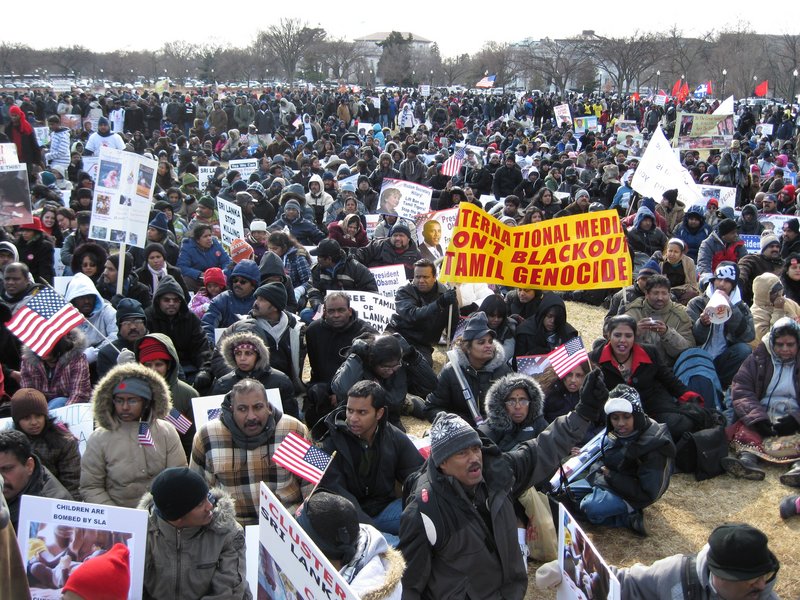As part of a series marking the atrocities of Mullivaikkal, we invited activists, journalists, and writers from around the world to share their experiences and reflections a decade on.

From the Ashes
10 years ago.
I remember the desperation. The panic. The fear. The loss. Constantly checking Tamil Net, hoping against hope that something had changed. That the body count hadn’t gone up again. That the hospitals and then the makeshift-hospitals weren’t attacked again. That the government agreed to a ceasefire.
And losing that hope, little by little, each time I read the news.
I was living in Washington, DC. I was working on Capitol Hill, literally walking the halls of power.
And I was totally helpless.
Our efforts were seemingly successful — our call-in campaigns and protests, our fasts and lobby days, our Action Alerts and Capitol Hill hearings, our letters from Members of Congress and our letters to the editor — we demanded the bloodshed stop.
We asked our Members of Congress to write to Secretary of State Hillary Clinton, asking her to tell Rajapaksa to stop shelling civilians. It worked — Secretary Clinton called Rajapaksa in March and told him to stop firing on civilians.
But the shelling continued. The killings continued.
We pleaded with the US government to demand a ceasefire, and to allow civilians to access humanitarian aid. Stop the slaughter, we begged.
And then President Obama, from the White House lawn, called on the Sri Lankan government to stop shelling civilians.
But it wasn’t enough.
It was too little, too late.
Nothing was enough to stop Sri Lanka’s genocide.
So it reached its bloody climax on May 18. Tens of thousands of Tamils were massacred. Akkas, annas, ammas, appas. Tens of thousands of lives taken, and countless more forever broken.
On May 18, I cried in a bathroom stall on Capitol Hill. I cried for my brothers and sisters, who gave their lives for the Tamil struggle, and who wouldn’t see the Eelam they and we dreamed of. I cried for my brethren, who were butchered like cattle in “no fire zones,” as their screams fell on deaf ears.
And I cried for our nation, which was crippled by this calamity.
I was heartbroken, in a way I never had been before, and never was again after.
I mourned.
But I couldn’t give up, as much as I wanted to. As much as we’d lost. We had to sustain our activism. The victim-survivors were locked into internment camps, “machine gun nests” with rampant sexual abuse and disappearances.
So I continued mourning, and acted in their memory.
Our fight wasn’t over.
…
And it isn’t over today. With the militarization and colonization of our homeland. With the boots of war criminals still walking over the blood-stained Eelam nation.
Our fight continues. For self-determination. For survival.
And our sisters in our homeland lead the way. Demanding to know the whereabouts of the disappeared. Demanding the return of their land.
They stand strong, and we stand in their shadow.
In the last 10 years, we have seen the worst of humanity. We have seen genocide and mass atrocities perpetrated by the Sri Lankan government, and acquiescence and indifference by the international community.
But we have also seen the best of humanity. The resilience of our Tamil nation. The determination of our community, in the homeland and in the diaspora, to remember May 2009 and honor those we lost with justice and accountability.
And someday, hopefully, peace.
-----
Tasha Manoranjan is the Executive Director of People for Equality and Relief in Lanka (PEARL).
Read more reflections on our collaborative website with Adayaalam Centre for Policy Research, Tamil Guardian and 47 Roots at www.RememberMay2009.com
We need your support
Sri Lanka is one of the most dangerous places in the world to be a journalist. Tamil journalists are particularly at threat, with at least 41 media workers known to have been killed by the Sri Lankan state or its paramilitaries during and after the armed conflict.
Despite the risks, our team on the ground remain committed to providing detailed and accurate reporting of developments in the Tamil homeland, across the island and around the world, as well as providing expert analysis and insight from the Tamil point of view
We need your support in keeping our journalism going. Support our work today.
For more ways to donate visit https://donate.tamilguardian.com.

